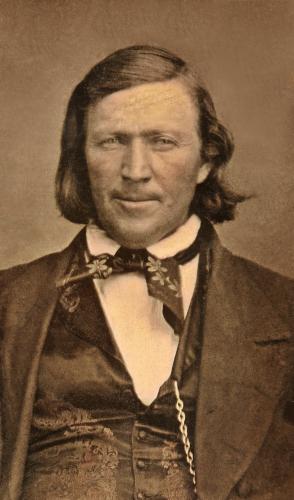6.3 Excerpt from New York Herald, Horace Greeley interviews Brigham Young on slavery
New York Herald editor Horace Greeley interviews Brigham Young in 1859 regarding his views on slavery
Document Introduction
Brigham Young’s 1859 interview with newspaper editor Horace Greeley encapsulates the seeming contradictions in Young’s position on slavery.[1] He at once calls slavery “of Divine institution” and acknowledges that there are slaves in Utah Territory and then flatly declares that if Utah were admitted into the Union it would be a free state. Rather than contradictory, it was an accurate description of realities in the territory and of Young’s position. He simultaneously tolerated slavery in Utah Territory and remained opposed to its form of practice in the South. He believed in its biblical sanction as “servitude” and an Act in Relation to Service allowed for its existence as such. And, if Utah were admitted to the Union, it would be a free state. The vote at the Utah constitutional convention in 1856 and Young’s interview with George A. Smith afterward make it clear that Young’s position to Greeley was consistent with his stance throughout the 1850s. It was not mere public performance when Young told Greeley, “No; she will be a free State.”
Of course, Congress rejected six of Utah’s seven applications for statehood and the sticking points were polygamy and theocracy, not slavery. Young’s position ultimately did not matter because the nation had long abolished slavery by 1896 when it was finally willing to allow Utah into the sisterhood of states. Young was dead for almost two decades by that point. As a territory, Utah’s position on enslavement did not affect the balance of power in Congress but as a state it would. Territories could not elect senators or have a vote in national politics. In the tumultuous decade of the 1850’s, marred by sectional division and culminating in war, Utah’s position on slavery would have mattered in national politics only if it were admitted as a state. Young made it clear in 1856 that Utah would be a free state if given the opportunity, a position he publicly reiterated to Greeley in 1859. Congress, however, denied Utah the chance to prove the truth of Young’s claim. Following the Civil War Congress then put polygamy on par with slavery and aimed its moral indignation at the territory, making sure that both “relics of barbarism” were eradicated from Utah before allowing statehood in 1896.[2]
[1] Horace Greeley, “Letter of Horace Greeley. Two Hours with Brigham Young,” New York Herald, August 24, 1859, 2.
[2] For the ways that Congress linked polygamy and slavery both before and after the Civil War see W. Paul Reeve, Religion of a Different Color: Race and the Mormon Struggle for Whiteness (New York: Oxford University Press, 2015), chapter 5. For the 1856 Republican party platform using the “relics of barbarism” language, see Kirk H. Porter and Donald Bruce Johnson, eds., National Party Platforms, 1840-1956 (Urbana: University of Illinois Press, 1956), 27.


